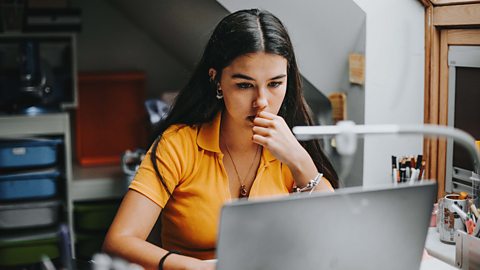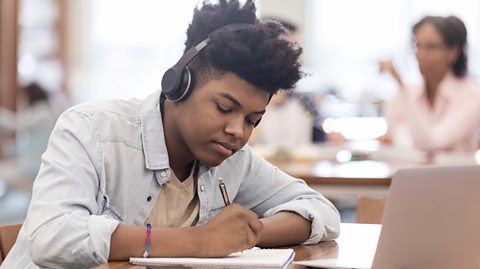Sign up to the BBC Bitesize newsletter! External LinkSign up to the BBC Bitesize newsletter!
For home education news and stories plus updates on the latest Bitesize content, register for our newsletter today.

Whether you’re home educating your child, or your child attends a school setting, there’ll come a time when they need to study without you next to them. Independent learning can have many benefits – increased confidence being just one – but there are strategies children need to learn, and mental processes they need to go through, before they can work in this way.
BBC Bitesize has some tips on how you can help your child begin to learn independently (and maybe get the washing or a work call done while they’re at it?!).
Independent learning: what it is and how it works
“Independent learning develops a child’s self-confidence and motivation. Children’s initiative and creative thinking is enhanced.” – Wendy Charles-Warner, Education Otherwise
What is independent learning?
Independent learning is when a child undertakes a piece of educational work by themselves, whether that’s a specific subject, short- or long-answer questions, multiple choice, essays, research, reading… It may sound quite straightforward asking your child to do a piece of work alone, but there’s actually quite a lot they need to learn before they can successfully self-study.
Alex Quigley is Head of Content and Engagement at educational charity the Education Endowment Federation (EEF), and a former English teacher. He explains that children need to know how to plan their time, allocate resources, prepare their learning environment and understand ways of managing tasks before they can begin a piece of independent work.
They also need to have a reasonable grasp of the subject before they can study it without you (this same rule applies to homework). Once they’ve completed a task, it’s also useful for them to reflect on what they’ve done and think about what strategies may help them with a future piece of work.

How independent learning works
Dr Robert Beadel is a Consultant Educational Psychologist and co-founder of Psychology4Learning. He says: “The development of independent learning skills can help the student develop a greater sense of control over their learning. The idea that ‘I know what to do in this situation’ helps to reduce anxiety (the feeling of not being in control) and promotes confidence.”
Once they’ve developed the strategies needed, independent learning works by allowing your child to manage some or all of a task, by:
taking responsibility for a piece of learning and how they’ll approach it
deciding where they’ll work and for how long
creating learning outcomes, or thinking about what they want to achieve
carrying out their own research and finding their own resources
self-reflecting on what they’ve learned
What are the benefits of independent learning?
Independent learning helps a child develop many skills they can apply throughout their learning and into their adult life:
time management
an understanding of their strengths and weaknesses
increased confidence
critical thinking and problem solving skills
independence
creative thinking
Wendy Charles-Warner is Chair of Education Otherwise, a charity supporting families whose children are educated outside school. She says independent learning can teach children to persevere and find their own solutions: “By working around an issue they develop wonderful, flexible thinking which supports lifetime success.”
Robert Beadel adds: “If we learn that our successful learning outcomes are linked to something that we control (effort), rather than to something we do not (ability), we’re more likely to approach tasks with confidence.”
How to encourage independent learning
“Don’t assume your child is a natural planner!” – Alex Quigley, EEF
There are three stages to effective independent learning in your child:
planning
pause and analyse
reflect and consolidate

Planning
Alex Quigley says: “Don’t assume your child is a natural planner!” You may need to help them prepare for independent work. Discuss things like how much they already know about the subject, how they’re going to tackle it, and whether they’ve got the right materials and logins:
“Often children are over confident, they want to get started, they rush into it and they run into problems… Try to slow them down and plan a bit more carefully.”
For example, if they’re writing a story, you could suggest they create a checklist covering the things that make a good story, such as developing the character, what problem or mystery they might solve, how they’ll organise it, and designing a paragraph plan to make it clear.
You might also want to help them think about:
Space: where would be best to work independently in your house? Do they want to be alone, or near to you?
Distractions: encourage them to put their phone and other screens away for a certain period of time.
Tools: what things do they need before they start, like a computer, pen, paper, calculator, protractor, etc?
Pause and analyse
As Alex mentions above, many children want to rush through work just to get it done. But the secret to successfully completing independent work is for a child to take the time to pause and think about what they’ve done so far. This also helps with consolidation of learning (more on that below).
“Ten minutes is a long time if you’re doing a complex task independently. Encourage them to stop, check and monitor what they’re doing… Can they re-read and check over their work, check back to their original plan, check spelling and vocab… if they’re getting stuck, are there any patterns?”
Wendy from Education Otherwise says it’s also important to praise a child’s attempts and not just their successes because “children will develop strategies if allowed to learn from their mistakes.” She suggests asking open questions if they’re struggling, such as “I wonder what would happen if you tried ‘X’ or ‘Y’?” rather than explicitly telling them what’s ‘right’ or ‘wrong’.
Reflect and consolidate
The final step is to help them reflect on what they did, what they learned, what went well, and what they might do differently next time. Ask them open questions about their work and their process. This leads to better metacognition, which is essentially understanding themselves and how they work best. Be aware though that they may be tired, so any reflection you do together, such as reading an essay back aloud, may need to be brief to begin with.
What is child-initiated learning?
Child-initiated learning is different to independent learning, in that it generally involves choosing a topic to learn based on what a child is into that day. As a home educator, you may be able to incorporate some child-initiated learning into your timetable, depending on how structured you want your home learning to be.

Tips for helping a child with SEND learn independently
Helping a child with Special Educational Needs and Disabilities (SEND) to learn independently will depend on their specific needs. Alex Quigley suggests really trying to seek out and understand what the barriers to learning may be for your child, and access the specific support they need that will be laid out in, for example, their Education and Health Care Plan (EHCP).
For example, if your child has dyslexia: “Try and understand dyslexia as well as you can as a parent and find those two or three strategies that really help your child. Being read to or listening to audiobooks is a really helpful strategy. For some autistic children, the physical, sensory environment really matters, so make it a calm sensory environment (for them to work in).”
You may also be interested in knowing how to apply for SEND funding for home education.
Five independent learning strategies
If you’re ready to get your child learning independently, use these final strategies to get started. And don’t underestimate the importance of regular breaks, drinks and snacks!
- Prompt your child to write a checklist before they start, so they can think about what they want to get done.
- Talk to them about what they’ll do if they don’t understand something: will they ask you, research it more online, refer to a textbook, or take a break and come back to it later?
- Encourage them to work for 10-15 minutes and then reflect.
- Support a healthy learning environment: no distractions, regular breaks and snacks.
- Teach them time management techniques like the pomodoro technique (25 minutes working followed by a five minute break).
Where can I read more about independent learning?
BBC Bitesize has a range of articles to help you find out more!
Building your child’s study skills
Where can I find more support for home education and parenting?
The BBC Bitesize home education collection is designed to support you and your child’s learning at home with free resources for early years and foundation stage (EYFS), primary and secondary-age students.
Bitesize Parents’ Toolkit is the go-to place for the whole parenting community to find stories, expert advice and fun activities.
If your child has special educational needs and / or disabilities, be sure to check out the Parents’ Toolkit SEND collection. Bitesize also has a collection of Sensory Stories, an immersive video series that transports you on unique sensory adventures, for children with additional or complex needs.
For more information about home education, these BBC News articles cover the rise in families deciding to educate their children at home and, from 2021, the impact of Covid on home education.